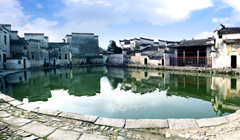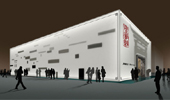Anhui Pavilion well-received by Expo visitors
2010-06-10
After seeing the Anhui Pavilion inside the China Pavilion at the Shanghai Expo Site on Tuesday, visitor Peng Ziliang wrote, "Anhui Pavilion is excellent," in the visitors book, while Wang Dejun penned this line: "Anhui, I love you."
Tens of thousands of visitors have swarmed in each day to view the Anhui Pavilion, one of 31 Chinese Province Pavilions inside the China Pavilion, and the pavilion has been quite well-received, as many visitors like to leave a message in the visitors book, said Li Ming, a staff worker at Anhui Pavilion.
According to the official Expo website, as many as 413,400 tourists visited the Expo site on Tuesday, the 40th day since its opening, and some 40 percent of them were group visitors.
It has been estimated that 400,000 people a day will visit its 140 pavilions during the Shanghai World Expo, open from May 1 to Oct 31, and it is expected to draw 70 million visitors from around the world.
Anhui Pavilion chief builder Ai Xinsheng said the pavilion started its preparations on Jan 15 this year and finished the work on April 16, when trial exhibitions began, adding that they intended to make Anhui Pavilion unique and leave an unforgettable impression on visitors.
The 600-sq-m hall follows the unique Hui-style architecture, creating a harmonious composition of ancient Chinese buildings. The exterior of the pavilion uses a Barrisol curtain wall with rectangular fenders inside to absorb daylight, so as to create the feel of a typical Hui-style building that can easily stand out among pavilions.
Shanghai native Shen Xiaoyan, 6, who came with her family to see the Anhui Pavilion on Tuesday, said the pavilion is beautiful.
S. Ziauddin, who came from Pakistan with three other Pakistanis, toured the Anhui Pavilion, sat outside the building to listen to the audio & visual explanations and nodded in satisfaction.
According to Chen Xianjin, deputy director general of the Bureau of Shanghai World Expo Coordination, each of the 31 provinces, autonomous regions and municipalities on the Chinese mainland has an exhibition area of 600 sq m within the China Pavilion, where visitors can learn about Chinese history and cultural traditions.
Anhui Pavilion chief designer Xu Qiang said the pavilion, themed, "Without a Huizhou businessman, there will be no towns," is a grand hall of knowledge offering the past, present and future of the flourishing province.
The Anhui Pavilion includes two main exhibition zones. The first zone, named "Anhui Impression," focuses on the historical impact of Hui culture highlighted by its intrinsic philosophy of harmony and innovation on modern life, while the other exhibition area "Colorful City" showcases a round theater where visitors can listen to a seven-minute audio and visual explanation coming from all sides.
Shi Ling, a division chief from Anhui Provincial Information Office, said Anhui is an important participant in the Expo and Anhui Pavilion is a major platform to showcase the province to the world.
Visitor Chen Changzheng said that although he knows Anhui is known for its mountains, rivers and its Huangmei Opera, the tour of Anhui Pavilion really offers much more.
After seeing many national pavilions, 48-year-old Chang Naling said she thought the China Pavilion was the most beautiful as it is easier for her to understand.
Chang, from Maanshan Hongli Rubber Products Co. in Anhui, said she was quite impressed by the China Pavilion, which is located at the crossing of two horizontal and vertical axes in the Pudong part of Expo Site and began its construction on Dec 18, 2007.
The China Pavilion comprises three parts: a 20,000-sq-m national hall, 30,000-sq-m for provinces (autonomous regions and municipalities), and 3,000-sq-m shared among Hong Kong, Macao and Taiwan.
Ruti Leshman, a visitor from Israel, standing inside the China Pavilion with three companions, said she was quite amazed. The China Pavilion has a core exhibition area on the top floor, an experience area on the second and a functional area on the first.
By Ma Chenguang (China Daily)




